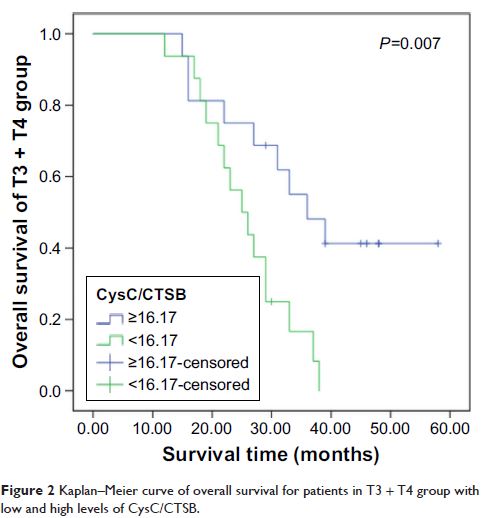109568
论文已发表
注册即可获取德孚的最新动态
IF 收录期刊
- 3.4 Breast Cancer (Dove Med Press)
- 3.2 Clin Epidemiol
- 2.6 Cancer Manag Res
- 2.9 Infect Drug Resist
- 3.7 Clin Interv Aging
- 5.1 Drug Des Dev Ther
- 3.1 Int J Chronic Obstr
- 6.6 Int J Nanomed
- 2.6 Int J Women's Health
- 2.9 Neuropsych Dis Treat
- 2.8 OncoTargets Ther
- 2.0 Patient Prefer Adher
- 2.2 Ther Clin Risk Manag
- 2.5 J Pain Res
- 3.0 Diabet Metab Synd Ob
- 3.2 Psychol Res Behav Ma
- 3.4 Nat Sci Sleep
- 1.8 Pharmgenomics Pers Med
- 2.0 Risk Manag Healthc Policy
- 4.1 J Inflamm Res
- 2.0 Int J Gen Med
- 3.4 J Hepatocell Carcinoma
- 3.0 J Asthma Allergy
- 2.2 Clin Cosmet Investig Dermatol
- 2.4 J Multidiscip Healthc

血清组织蛋白酶 B 和半胱氨酸蛋白酶抑制剂 C 两者的水平及比率对食管癌患者预后的临床意义
Authors Yan Y, Zhou K, Wang L, Wang F, Chen X, Fan Q
Received 23 September 2016
Accepted for publication 10 December 2016
Published 3 April 2017 Volume 2017:10 Pages 1947—1954
DOI https://doi.org/10.2147/OTT.S123042
Checked for plagiarism Yes
Review by Single-blind
Peer reviewers approved by Dr Chang Liu
Peer reviewer comments 3
Editor who approved publication: Dr Samir Farghaly
Objective: The main purpose of this study was to analyze the serum
cathepsin B (CTSB) and cystatin C (CysC) levels in patients with esophageal
carcinoma and their correlation with the clinical indices and prognosis.
Methods: The serum levels of CTSB and CysC from 56 patients
with esophageal carcinoma and 30 healthy donors were determined preoperatively
by using enzyme-linked immunosorbent assay. The correlation between CTSB and
CysC was evaluated by Spearman correlation coefficient test. Kaplan–Meier
survival curves were plotted, while the survival rates were compared using the
log-rank test. Univariate and multivariate analyses of prognostic factors for
survival were performed using the Cox proportional hazard regression model with
a 95% confidence interval.
Results: CTSB (38.35±4.3 ng/mL) and CysC (703.96±23.6 ng/mL)
levels were significantly higher in the sera of the patients than in controls.
A significant correlation was observed between CTSB and CysC (r =0.754, P <0.001). The
levels of CTSB and CysC/CTSB in the patient serum significantly correlated with
the T status. CysC/CTSB ratio was also found to be significantly correlated
with lymph node metastasis. None of the parameters were observed to be related
to CysC, including age, gender, pathologic type, tumor differentiation and
tumor invasion depth. Kaplan–Meier analysis showed that patients with higher
levels of CysC/CTSB and negative lymph node metastasis experienced
significantly longer overall survival time, whereas patients with higher CSTB
levels tended to live shorter, although the difference was not statistically
significant (P =0.081).
Conclusion: Serum CTSB and CysC levels are of diagnostic
significance in esophageal cancer. The ratio of serum CysC/CTSB is prognostic
for the survival of esophageal carcinoma patients.
Keywords: esophageal squamous cell carcinoma,
cathepsin B, cystatin C, diagnostic value, prognosis
